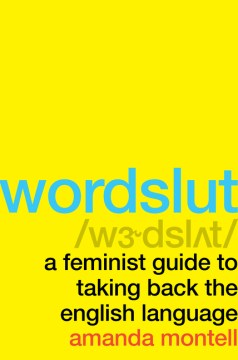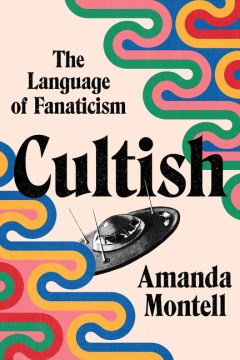Amanda Montell is a writer and linguist, which means she makes her living studying not only the way the English language has evolved and developed over time, but the ways in which society deploys language to accomplish meaning, identity, hierarchical structures and more. Her books are both approachable in the kind of way few linguistic scholars achieve; you don’t need to know much, if anything, about linguistics or grammar to be completely engaged in Montell’s writing. Additionally, the topics Montell speaks on are timely and relevant to larger societal concerns regarding the deployment of language; her second book, Cultish: The Language of Fanaticism, tackles modern-day cults and cult-adjacent groups, such as CrossFit, to illuminate the ways in which social media can often perpetuate these harmful practices.
BOOK INFORMATION
Genres: Non-fiction, Linguistics, Social Change
First Released: 2019
Call Number:422.973 MON
Find it: Physical copy on the 3rd Floor.
SUMMARY
A brash, enlightening and wildly entertaining feminist look at gendered language and the way it shapes us.
The word bitch conjures many images, but it is most often meant to describe an unpleasant woman. Even before its usage to mean “a female canine,” bitch didn’t refer to women at all—it originated as a gender-neutral word for “genitalia.” A perfectly innocuous word devolving into an insult directed at females is the case for tons more terms, including hussy, which simply meant “housewife,” and slut, which meant “an untidy person,” and was also used to describe men. These are just a few of history’s many English slurs hurled at women.
Amanda Montell, reporter and feminist linguist, deconstructs language—from insults, cursing, gossip and catcalling to grammar and pronunciation patterns—to reveal the ways it has been used for centuries to keep women and other marginalized genders from power. Ever wonder why so many people are annoyed when women speak with vocal fry or use like as filler? Or why do some gender-neutral terms stick, and others don’t? Or where do stereotypes of how women and men speak come from in the first place?
Montell effortlessly moves between history, science and popular culture to explore these questions—and how we can use the answers to affect real social change. Montell’s irresistible humor shines through, making linguistics not only approachable but downright hilarious and profound. Wordslut gets to the heart of our language, marvels at its elasticity and sheds much-needed light on the biases that shadow women in our culture and our consciousness.
EYAN’S REVIEW
There is an assumption that the English language is value-neutral, as in, there is no inherent moral value ascribed to certain words over others. Montell, highly aware of this societal assumption as well as possessing the education to disprove such suppositions, titled her books very intentionally, as we see in Harper Collins’s book summary. I was highly impressed with this book, and I return to some of the chapters frequently. In particular, Montell has a chapter discussing the uses of grammar in casual conversation. I’m not sure about you, but when I was a literature obsessed teenager, I was very particular about using grammar perfectly all the time. When my classmates and companions would use text speak and lingo, I’d roll my eyes and insist on full-text sentences complete with punctuation (and this was when texting took effort; remember how many times you’d have to tap the 7 just to get an s?) and considered myself a self-proclaimed “grammar nazi.” Now, I look back on this period of my life with a lot of cringing, not least of which because I would never use that term so casually or describe myself in such a way now, but also because I feel very differently about the job of grammar within language.
Montell’s Wordslut was one of the texts that helped me reevaluate the ways I was using language in ways I hadn’t anticipated or intended. I almost wish I had come across the book sooner, as I think the way Montell writes is much more readable than some similar, though no less important, authors that I had encountered earlier, such as Word By Word: The Secret Life of Dictionaries published by Kory Stamper in 2017. Kory Stamper, a lexicographer (someone who writes dictionaries) and former associate editor for the Merriam-Webster dictionary, has an incredibly realistic approach to the English language and the authority of dictionaries. What both scholars present in their published work is an insight into the structures of language and dictionaries, which serve as the written authority for English, showing us that the words we use have developed from a specific, intentional and often harmful past.
However, even with the plethora of examples found in both texts, the conversation feels largely arbitrary and theoretical. This is why I think Montell’s second book, Cultish, should absolutely be read in conjunction with her first (and with Stamper’s). Cultish expands the conversation from the acknowledgment of structure, to illustrating the ways in which real people and organizations have used and still use language’s harmful structures to make money or self-promote.
BOOK INFORMATION
Genres: Non-fiction, Linguistics, Cult followings
First Released: 2021
Call Number: 306.44 MON
Find it: Physical copy on the 3rd Floor.
SUMMARY
What makes “cults” so intriguing and frightening? What makes them powerful? The reason why so many of us binge Manson documentaries by the dozen and fall down rabbit holes researching suburban moms gone QAnon is because we’re looking for a satisfying explanation for what causes people to join—and more importantly, stay in—extreme groups. We secretly want to know: could it happen to me? Amanda Montell’s argument is that, on some level, it already has . . .
Our culture tends to provide pretty flimsy answers to questions of cult influence, mostly having to do with vague talk of “brainwashing.” But the true answer has nothing to do with freaky mind-control wizardry or Kool-Aid. In Cultish, Montell argues that the key to manufacturing intense ideology, community and us/them attitudes all comes down to language. In both positive ways and shadowy ones, cultish language is something we hear—and are influenced by—every single day.
Through juicy storytelling and cutting original research, Montell exposes the verbal elements that make a wide spectrum of communities “cultish,” revealing how they affect followers of groups as notorious as Heaven’s Gate, but also how they pervade our modern start-ups, Peloton leaderboards and Instagram feeds. Incisive and darkly funny, this enrapturing take on the curious social science of power and belief will make you hear the fanatical language of “cultish” everywhere.
EYAN’S REVIEW
Maybe it’s because my mom and aunt sold Tupperware for a while when I was young, and Pampered Chef, and I’m sure one or two other MLM (multi-level marketing) ploys throughout the years, but I found Cultish incredibly frank, relatable and understandable. Montell explores in her second publication the incredibly socially charged word “cult” by examining the stereotypical mainstream cults (the Manson family, Johnstown, Heaven’s Gate) with the lesser-thought-of ones permeating the health industry (Soul Cycle) and their use of language. I found it to be a fantastically important book which examines the extremes of linguistic excess, of fanaticism. While Montell takes the time to explain the linguistic developments behind her arguments, I think her argument is only strengthened with the background knowledge gained from reading her first book. Both books are fascinating and impactful, and definitely worth the read.


